Related Research Articles
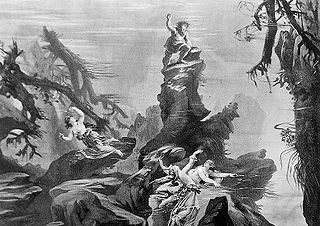
Der Ring des Nibelungen, WWV 86, is a cycle of four German-language epic music dramas composed by Richard Wagner. The works are based loosely on characters from Germanic heroic legend, namely Norse legendary sagas and the Nibelungenlied. The composer termed the cycle a "Bühnenfestspiel", structured in three days preceded by a Vorabend. It is often referred to as the Ring cycle, Wagner's Ring, or simply The Ring.

Das Rheingold, WWV 86A, is the first of the four music dramas that constitute Richard Wagner's Der Ring des Nibelungen. It was performed, as a single opera, at the National Theatre Munich on 22 September 1869, and received its first performance as part of the Ring cycle at the Bayreuth Festspielhaus, on 13 August 1876.
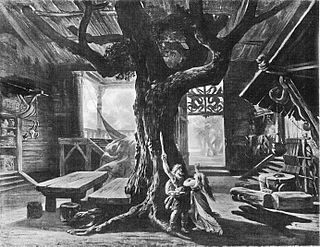
Die Walküre, WWV 86B, is the second of the four music dramas that constitute Richard Wagner's Der Ring des Nibelungen. It was performed, as a single opera, at the National Theatre Munich on 26 June 1870, and received its first performance as part of the Ring cycle at the Bayreuth Festspielhaus on 14 August 1876.

The Bayreuth Festspielhaus or Bayreuth Festival Theatre is an opera house north of Bayreuth, Germany, built by the 19th-century German composer Richard Wagner and dedicated solely to the performance of his stage works. It is the venue for the annual Bayreuth Festival, for which it was specifically conceived and built. Its official name is Richard-Wagner-Festspielhaus. It is the home of the Bayreuth Festival Orchestra.

The Bayreuth Festival is a music festival held annually in Bayreuth, Germany, at which performances of stage works by the 19th-century German composer Richard Wagner are presented. Wagner himself conceived and promoted the idea of a special festival to showcase his own works, in particular his monumental cycle Der Ring des Nibelungen and Parsifal.

Francesca Gaetana Cosima Wagner was the daughter of the Hungarian composer and pianist Franz Liszt and Franco-German romantic author Marie d'Agoult. She became the second wife of the German composer Richard Wagner, and with him founded the Bayreuth Festival as a showcase for his stage works; after his death she devoted the rest of her life to the promotion of his music and philosophy. Commentators have recognised Cosima as the principal inspiration for Wagner's later works, particularly Parsifal.
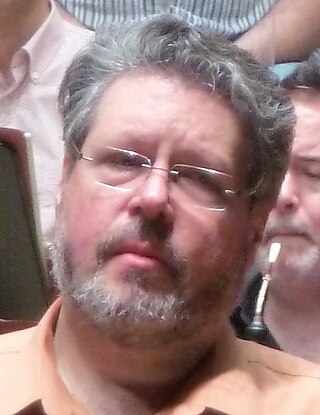
Stephen Grady Gould was an American heldentenor and leading interpreter of Richard Wagner's stage works. He performed around 100 times at the Bayreuth Festival, especially as Tannhäuser, first in 2004, Siegfried, and Tristan, all three even in one year in 2022 which earned him names such as Iron Man.

Dame Gwyneth Jones is a Welsh dramatic soprano, widely regarded as one of the greatest Wagnerian sopranos in the second half of the 20th century.
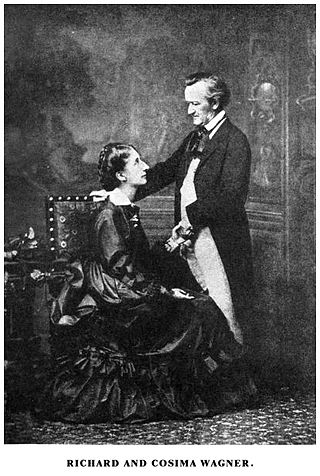
The Bayreuth canon consists of those operas by the German composer Richard Wagner (1813–1883) that have been performed at the Bayreuth Festival. The festival, which is dedicated to the staging of these works, was founded by Wagner in 1876 in the Bavarian town of Bayreuth, and has continued under the directorship of his family since his death. Although it was not originally held annually, it has taken place in July and August every year since the 75th anniversary season in 1951. Its venue is the Bayreuth Festspielhaus, which was built for the first festival. Attendance at the festival is often thought of as a pilgrimage made by Wagner aficionados.

The Forest Opera is an open-air amphitheatre located in Sopot, Poland, with a capacity of 5047 seats, the orchestra pit can contain up to 110 musicians.
Fritz Hübner was a German operatic bass. Active from the late 1950s through the 1980s, he was particularly known for his performances in operas by Richard Wagner.
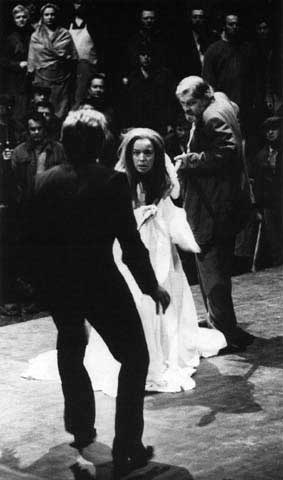
The Jahrhundertring was the production of Richard Wagner's Ring cycle, Der Ring des Nibelungen, at the Bayreuth Festival in 1976, celebrating the centenary of both the festival and the first performance of the complete cycle. The festival was directed by Wolfgang Wagner and the production was created by the French team of conductor Pierre Boulez, stage director Patrice Chéreau, stage designer Richard Peduzzi, costume designer Jacques Schmidt and lighting designer André Diot. The cycle was shown first in 1976, then in the following years until 1980. It was filmed for television in 1979 and 1980. While the first performance caused "a near-riot" for its brash modernity, the staging established a standard, termed Regietheater, for later productions.

Uwe Eric Laufenberg is a German actor, stage director for play and opera, and theatre manager who has directed at international opera houses and festivals, such as Elektra at the Vienna State Opera and Parsifal at the Bayreuth Festival.

Manfred Jung was a German operatic tenor, who performed Wagner's heldentenor roles internationally, including the Metropolitan Opera and the Bayreuth Festival where he was Siegfried in the Jahrhundertring, but he also sang all other tenor roles in Der Ring des Nibelungen.

Jutta Hanna Edith Hering-Winckler is a German lawyer and patron of music. Since 1977, she has been head of a law firm in Minden as a lawyer and notary. Since 1999, she has been president of the Richard Wagner Society in Minden. She received awards for her civic engagement as the driving force of the Wagner project at the Stadttheater Minden, particularly Der Ring in Minden, which brought her hometown to international recognition.

Der Ring in Minden was a project to stage Richard Wagner's cycle Der Ring des Nibelungen at the Stadttheater Minden, beginning in 2015 with Das Rheingold, followed by the other parts in the succeeding years, and culminating with the complete cycle performed twice in 2019. The stage director was Gerd Heinz, and Frank Beermann conducted the Nordwestdeutsche Philharmonie, playing on the stage of the small theatre. The singers acted in front of the orchestra, making an intimate approach to the dramatic situations possible. The project received international recognition and was compared favourably to the Bayreuth Festival.

Ursula Boese was a German operatic contralto. A member of the Hamburg State Opera from 1960 to 1993, she pursued an international career. She appeared as Stravinsky's Iocaste at the San Francisco Opera in the presence of the composer, as Wagner's Fricka in Wieland Wagner's last production of the Ring Cycle at the Bayreuth Festival, and as Verdi's Ulrica alongside Luciano Pavarotti.
Frank Philipp Schlößmann is a German scenic designer focused on operas who has worked at major opera houses and festivals internationally. He staged Janáček's Jenůfa at the Metropolitan Opera, Wagner's Der Ring des Nibelungen at both the Bayreuth Festival and Der Ring in Minden, and the world premiere of Heinz Holliger's Lunea at the Opernhaus Zürich.
Hans-Peter König is a German operatic bass best known for his roles in Wagnerian opera.
Erich Witte was a German stage actor, operatic tenor and opera director. He was based for almost five decades at the Berlin State Opera, and performed leading roles at major opera houses in Europe and at the Metropolitan opera. He participated in world premieres, including Louise Talma's Die Alkestiade and Alan Bush's Joe Hill.
References
- ↑ Skramstad, Per-Erik. "Der Ring des Nibelungen at the Bayreuth Festival - all the productions". Wagneropera.net. Retrieved 2023-10-22.
- ↑ Spotts, Frederic (1994). Bayreuth: a history of the Wagner festival. New Haven: Yale Univ. Press. ISBN 978-0-300-05777-5.
- ↑ Spotts 1994, pp. 246–248.
- ↑ "Bayreuth Festival: The 2018 Wagner celebration begins – DW – 07/25/2018". dw.com. Retrieved 2023-10-22.
- ↑ "Performance Database". Bayreuther Festspiele. Retrieved 2023-10-22.
- ↑ Herrmann, Hubertus (2020-03-31). "Suspension Bayreuth Festival 2020". Bayreuther Festspiele. Retrieved 2023-10-22.